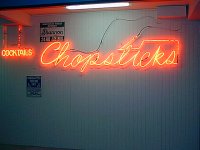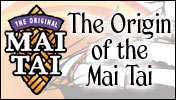The Mai Tai was one of the first drinks that I really dug my teeth into. What exactly was it? Where did it come from? But most importantly why were there so many different recipes for it, and why was it often made so poorly?
Ok… so this article started out as an overall discussion about the lack of a common standard as to what a recipe for different cocktails was. However, the topic sort of got away from me as soon as I started sharing my experiences with the Mai Tai, and so the article I originally intended to write will have to wait until some future time.
 The Mai Tai is one of the cocktails that served to set the foundation of my enthusiasm for trying to understand the "real" recipe for any particular drink. I can't remember exactly when I had my first Mai Tai, but I do remember the first restaurant whose Mai Tai's made an impression on me. It was at "Chopsticks", a cozy Chinese restaurant in North Seattle.
The Mai Tai is one of the cocktails that served to set the foundation of my enthusiasm for trying to understand the "real" recipe for any particular drink. I can't remember exactly when I had my first Mai Tai, but I do remember the first restaurant whose Mai Tai's made an impression on me. It was at "Chopsticks", a cozy Chinese restaurant in North Seattle.  This was before I was into cocktails at all, and the Mai Tai was really not a drink I knew much about, or had any habit of ordering. For some reason, when I saw the Mai Tai on their cocktail menu, it just seemed like the right thing to order. It was fabulous. Not too sweet, not too tart, no one flavor standing out predominately, in a word, balanced. A feature that I would eventually come to learn was a symbol of a truly quality cocktail. Mai Tai's at Chopsticks eventually became such a standard, that I no sooner would walk in the door, but that they have one ready for me at my table.
This was before I was into cocktails at all, and the Mai Tai was really not a drink I knew much about, or had any habit of ordering. For some reason, when I saw the Mai Tai on their cocktail menu, it just seemed like the right thing to order. It was fabulous. Not too sweet, not too tart, no one flavor standing out predominately, in a word, balanced. A feature that I would eventually come to learn was a symbol of a truly quality cocktail. Mai Tai's at Chopsticks eventually became such a standard, that I no sooner would walk in the door, but that they have one ready for me at my table.
A year or so later, I found myself in a Chinese restaurant in Yakima, and spotted the Mai Tai on their cocktail menu. Since that was the drink I had come to equate with Chinese food, I of course had to order it. Imagine my surprise when this drink tasted almost, but not quite, totally unlike what I had come to learn a Mai Tai should taste like. For one thing, it clearly included pineapple juice. It's not that I don't like pineapple juice; it's only that it just didn't belong in what my idea of a Mai Tai was. Which of course begged the question, how could two such totally different drinks be called by the same name, and which of these two was the "real" Mai Tai?
My research into the truth behind the Mai Tai started out by simply going to bookstores and libraries and seeing what sorts of recipes I would find listed for this drink (this was before the web had become the mega research tool it is today). To help you understand what I found, let's just take a sampling from a few of the books I have here at my fingertips. I won't list the full recipe, just the general ingredients themselves.
First, let's go for books that already focus on a "tropical/tiki" theme… with the hopes that they will have the best chance of having done their research:
"Beachbum Berry's Grog Log" by Jeff Berry Rum, orange curaçao, orgeat, sugar syrup, lime juice.
"Tiki Drinks" by Adam Rocke (listed as "Tiki Mai Tai") Rum, crème de noyaux, triple sec, pineapple juice, sweet & sour mix, crushed ice. (a blender drink)
"Tropical Bar Book" by Charles Schumann Dark rum, high-proof rum, apricot brandy, orgeat, Rose's lime juice, fresh lime juice.
Wow, three different books, three different recipes. Now let's go try some books written by friends of mine, whose opinions I trust, and see how they fair:
"The Bartender's Best Friend" by Mardee Haidin Regan: Dark rum, light rum, apricot brandy, triple sec, orgeat, sugar syrup, lime juice.
"Esquire Drinks" by David Wondrich Rum, orange curaçao, orgeat, sugar syrup, lime juice.
"The Craft of the Cocktail" by Dale DeGroff Rum, orange curaçao, orgeat, lime juice.
A little better, three books and we find only two different recipes. Mardee's is somewhat similar to that listed by Charles Schumann, while David and Dale list a recipe that is essentially the same of Jeff Berry's.
I happen to know that Mr. Berry is very passionate about his "Tiki" cocktails, and has done a lot of research into what he publishes, and so of all the recipes listed above, his is the one I would put the most faith into as being accurate. But this is something that the casual reader, or bartender, wouldn't know ahead of time, and so they would probably be rather confused at this time as to what the real recipe should be. The astute reader however would have noticed that in the writeups that accompanied the recipes, Berry, Wondrich, and Regan all attributed this drink as being created originally by Victor Bergeron (aka: "Trader Vic"), who opened an impressive chain of Tiki bars back in the 1940's and 50's (many of which are still open today around the world). So with that as the starting point of the next leg of this journey, let's see what we can find.
Looking through any of my old Trader Vic recipe books proves pointless. This drink isn't listed in any of them, even though they are published after this drink had apparently become popular. To understand the reason for that, it is important to understand what was going on in those days. Tiki bars were all the craze, "Don the Beachcomber" and Trader Vic's were perhaps the most famous, but there were countless others who were on the scene, all trying to "out tiki" the other one. One of the primary draws to these restaurants were the fact that they were so lavishly decked out with Polynesian style, that you almost felt like you had been transported to another part of the world, and thus were able to escape from the fairly stoic atmosphere that surrounded most Americans on those days. (If you are interested in more information about the Tiki culture of these days, I recommend "The Book Of Tiki" by Sven. A. Kirsten) Each of these restaurants focused on a signature set of cocktail recipes. Cocktails of course could not be found in the native cuisine of any of the Polynesian cultures, and so this meant that the restaurant owners brought their own creativity to bear to build recipes that relied on Rum, juices, and various exotic flavorings. To aid in the mystique of these signature recipes, they were often served in special tiki inspired glasses which were only used for that specific drink. To further enshroud these drinks in mystery, their recipes were closely guarded secrets. In many cases even the bartenders didn't know the recipes for them, they were often provided with a special "premix" to which they would add liquor and additional juices to, or in some cases they had unlabeled bottles which they simply knew which bottles, in which ratios to combine for the various drinks, without actually knowing what was in the bottles themselves. The true recipe for the Zombie has thus been obscured from the historical record. (Although in "Intoxica!" Jeff Berry believes he has finally uncovered a version of the recipe as written down by its creator, Don the Beachcomber.) This is why Trader Vic himself does not reveal the recipe for his most famous drink in any of his books.
It was this very cloak of secrecy that the different restaurants would encase their drink recipes in, which has brought about the confusion we now see with a drink such as the Mai Tai. Since Trader Vic was not about to share this recipe with his customers, much less other bartenders, if somebody happened to have a Mai Tai at Trader Vic, and then innocently attempted to order it at another bar, they would of course have a problem. At first, most bartenders would not have heard of this drink before, and so would admit their inability to make this drink for their customer, but in many cases they would try to quiz the customer as to what they recall about the drink, and thus be able to provide them with a close approximation. Imagine the customer describing the drink as: "It was a rum drink, with some sort of juices in it, and I think a bit of a reddish color". This of course could describe almost any of the drinks served by these Tiki bars, and yet the bartender would often try to piece something together that would make their customer happy. Often, they would come up with something that probably tasted quite good, and thus the next time a customer came in asking for a Mai Tai, they would deftly mix up another one of these drinks and eventually it would probably even make it onto their bar menu. This process would have then eventually brought about a dozen different recipes being served at the dozens of different Tiki bars across the country. Eventually, the dilution of this drink would have gotten so great, that the various bars themselves would have forgotten exactly how they came about these recipes, to the point of thinking that perhaps "they" were the origin of this by now common cocktail.
 Fortunately for our research efforts, in 1970 Victor Bergeron had become so tired of being constantly faced with various folks claiming to have created this recipe, that he contacted the customers whom he first created this drink for back in 1944, and got them to sign an affidavit which detailed how Mr. Bergeron had created an experimental cocktail for them, and after being served it, the guests (who were from Tahiti) exclaimed "Mai Tai - Roa Ae", which in Tahitian means "Out of This World - The Best". At this point he also detailed the recipe that they originally used for this drink, as well as how that recipe had gradually evolved over time until he had perfected a "premix" which was now being used at all of his restaurants. The very same premix I was later to learn which was used at "Chopsticks" to make the very Mai Tai that began this little journey. Thanks to the internet, unlike during my initial research, you can now find the story of Trader Vic's Mai Tai over on the Trader Vic's website.
Fortunately for our research efforts, in 1970 Victor Bergeron had become so tired of being constantly faced with various folks claiming to have created this recipe, that he contacted the customers whom he first created this drink for back in 1944, and got them to sign an affidavit which detailed how Mr. Bergeron had created an experimental cocktail for them, and after being served it, the guests (who were from Tahiti) exclaimed "Mai Tai - Roa Ae", which in Tahitian means "Out of This World - The Best". At this point he also detailed the recipe that they originally used for this drink, as well as how that recipe had gradually evolved over time until he had perfected a "premix" which was now being used at all of his restaurants. The very same premix I was later to learn which was used at "Chopsticks" to make the very Mai Tai that began this little journey. Thanks to the internet, unlike during my initial research, you can now find the story of Trader Vic's Mai Tai over on the Trader Vic's website.
Here is the original recipe for the Mai Tai as listed on the Trader Vic website:
| Mai Tai The original Trader Vic Formula |
- 2 ounces 17-year-old J. Wray Nephew Jamaican rum
- 1/2 ounce French Garnier Orgeat
- 1/2 ounce Holland DeKuyper Orange Curacao
- 1/4 ounce Rock Candy Syrup
- juice from one fresh lime
|
| Hand shake and garnish with half of the lime shell inside the drink and float a sprig of fresh mint at the edge of the glass. As originally created by Victor Bergeron |
And if we distill this down to just the raw ingredients, we end up with:
Rum, orange curaçao, orgeat, sugar syrup, lime juice.
From this we can see that three of our six authors indeed had the proper recipe in their books. The other authors were most likely relying on one of the recipes that some other bartender had arrived at in their attempt to duplicate the Mai Tai for one of their customers. Chances are, these authors didn't get these recipes directly from the bartender who had concocted them, but instead inherited them through many layers of indirection, until by the time they recorded them in their own books, they felt that they were truly providing an accurate recipe for this drink. Mardee Regan even provided a full description of the story surrounding how Victor Bergeron originally created the drink, and then provided the wrong recipe.
The Mai Tai is a classic cocktail whose original recipe has unfortunately been randomized through a clumsy hand-me-down process, until such a point that many bartenders don't know (or often don't even care) as to how it is properly made. As I have repeated several times over the years, cocktails are a form of cuisine. To pay proper respect to this craft, I feel that it is important to really understand the foundations of each recipe, and whenever possible discover as much as possible about its history and origins. Fortunately, each of you now knows what the "real" Mai Tai is, and can now carry forth with this recipe and stop the tragedy that has befallen this great drink.
NOTE: In "Hawai'i Tropical Rum Drinks & Cuisine by Don the Beachcomber" by Arnold Bitner, he provides a recipe for the Mai Tai by Don The Beachcomber which appears to pre-date Trader Vic's own story of when he first created this drink. The recipe that is listed in this book is a totally different recipe, and I do not believe it could possibly represent an attempt by Trader Vic to "clone" the Beachcomber recipe. Instead I believe that Trader Vic's drink was an original creation, which ended up being christened by his customers with a name which had unfortunately already been given to somebody else's drink. Arnold Bitner's book is an excellent book, and includes a wonderful collection of not only classic cocktail recipes, but also some wonderful food recipes as well. I highly recommend it to anybody interested in this type of cuisine.